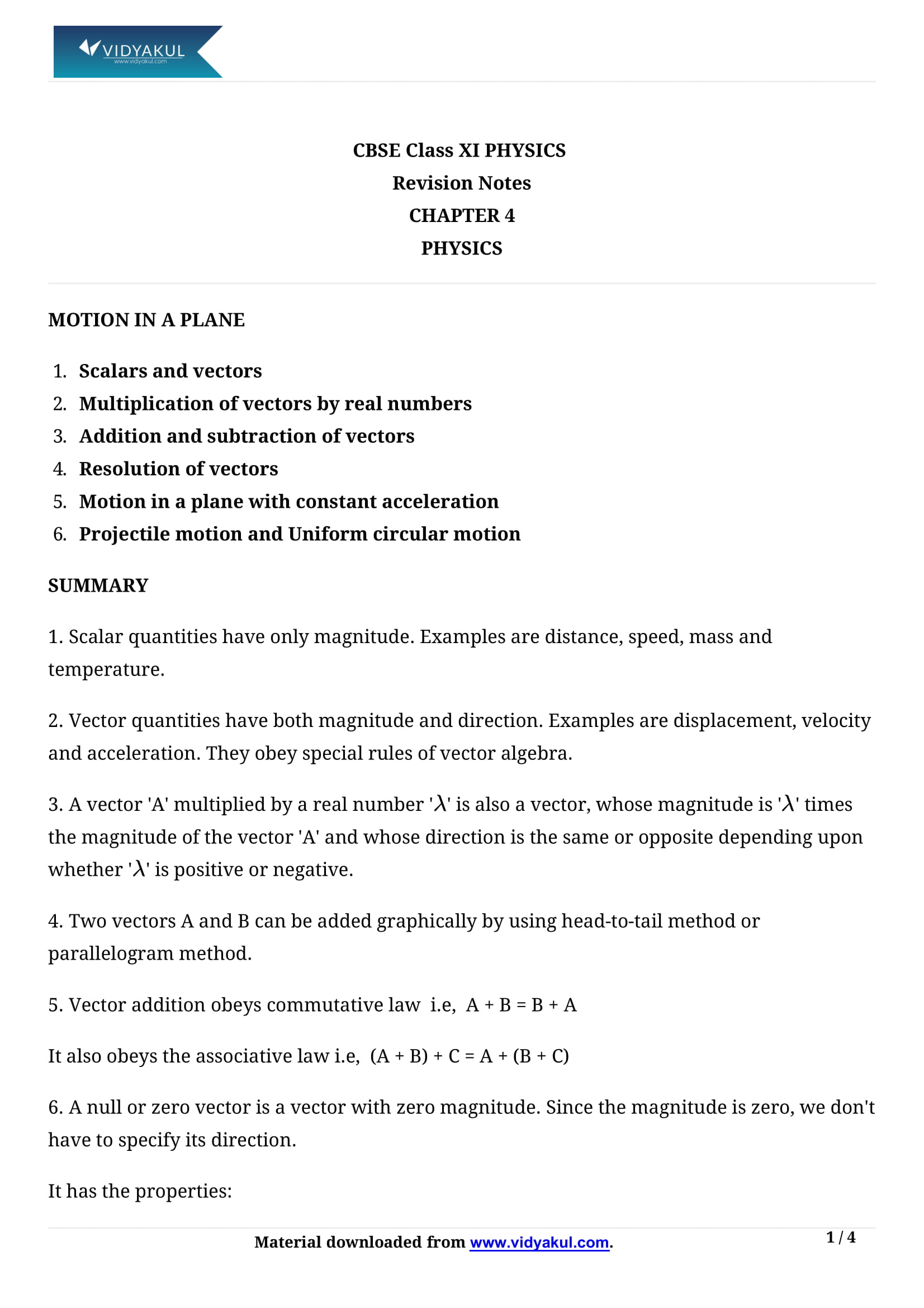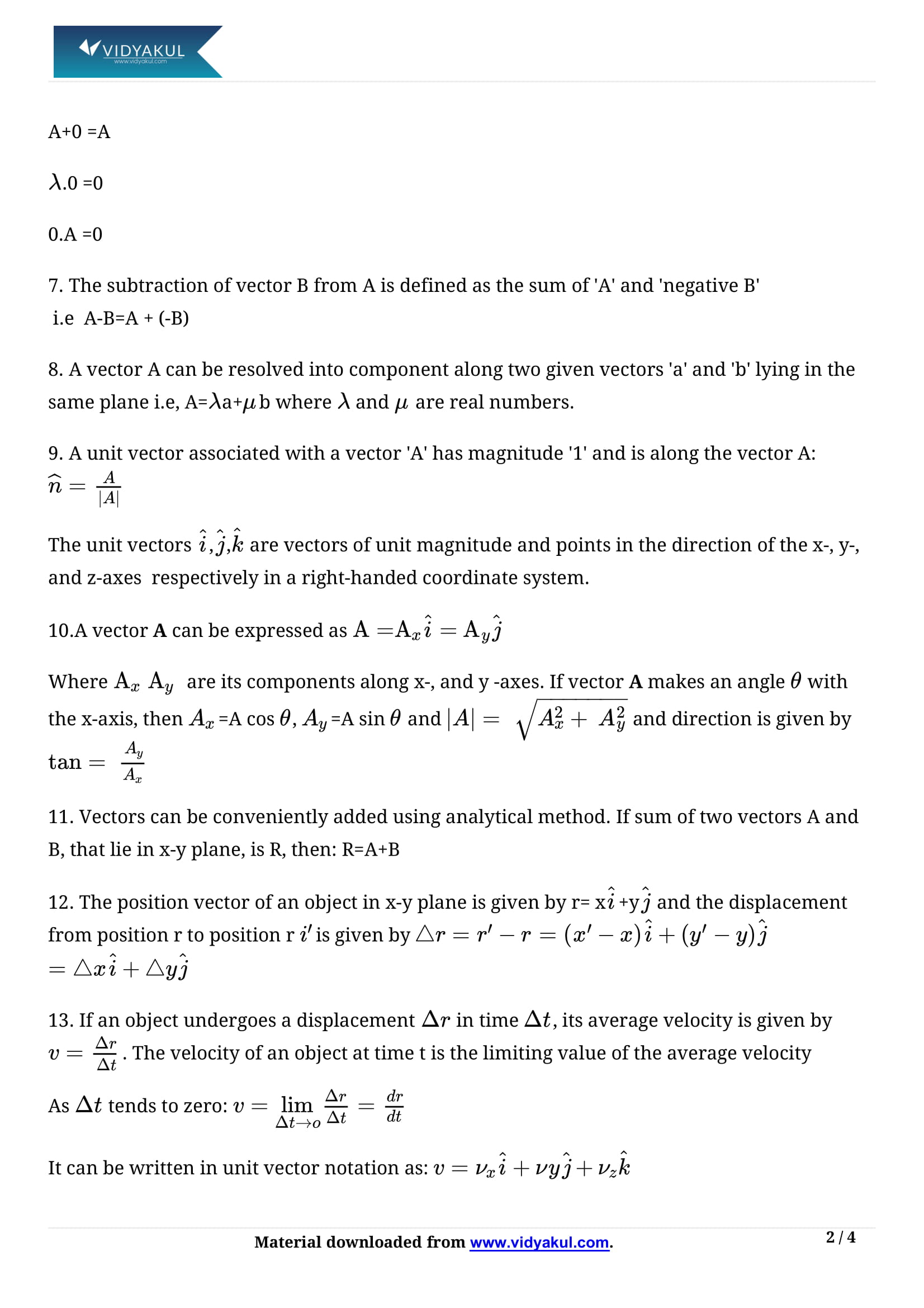Class 11 Physics Chapter 4 Motion in a Plane Notes

Chapter 4 Motion in a Plane
This is an important chapter for students. It introduces them to addition and subtraction of vector quantities, types, and vector resolutions. Chapter comprehension helps students answer the questions in the book. Later in this chapter, students learn about movements and their types.
In this article, Vidyakul presents the NCERT Class 11 Physics Chapter 4 notes to our esteemed readers. In addition to the free notes, students can practice over 300 questions in this chapter for free. These practice questions explain the 67 concepts in the chapter and help students pass the exam. Vidyakul also offers a free trial online test. Visit Vidyakul for more information.
CBSE CLASS 11th PHYSICS CH-4
Points to Remember
To help guide students in their exam preparations for NCERT 11th Physics Chapter 3 Motion in a Straight Line, we have provided some of the important points to remember below:
Average speed is the ratio of the total distance to the total time.
Average Velocity is the ratio of the total displacement to the total time.
Instantaneous Velocity is the rate of displacement with respect to time
Average acceleration is the ratio of total change in velocity to the total time taken.
Instantaneous Acceleration is the rate of change of velocity.
The slope of the distance-time graph gives speed.
The slope of the displacement-time graph gives velocity.
The slope of the velocity-time graph gives acceleration.
The area under the velocity-time graph gives displacement.
The area under the speed-time graph gives distance.
The area under acceleration time gives change in velocity.
Topics and Sub-topics
Prior to starting off with the NCERT Class 11 preparation for physics, it is necessary for you to be aware of the topics and sub-topics of NCERT Class 11 Physics chapter 3. Complete knowledge of the topics under NCERT Class 11 Physics chapter 3 will aid you in quick absorption of the information:
Few Important Questions
What does ‘Scalar’ quantity mean?
Scalar quantities are quantities that are described only by a magnitude. They do not have a direction of action.
What does ‘Vector’ quantity mean?
Vector quantity is a quantity that has both magnitude and direction.
What is meant by ‘Non uniform’ motion?
An object covers the unequal distance which is equal intervals of time then the object is said to have non uniform motion.
Practice Questions
State, for each of the following physical quantities, if it is a scalar or a vector:
volume, mass, speed, acceleration, density, number of moles, velocity, angular frequency, displacement, angular velocity.
Pick out the two scalar quantities in the following list:
force, angular momentum, work, current, linear momentum, electric field, average velocity, magnetic moment, relative velocity.
Pick out the only vector quantity in the following list:
Temperature, pressure, impulse, time, power, total path length, energy, gravitational potential, coefficient of friction, charge.
Average speed is the ratio of the total distance to the total time.
Average Velocity is the ratio of the total displacement to the total time.
Instantaneous Velocity is the rate of displacement with respect to time
Average acceleration is the ratio of total change in velocity to the total time taken.
Instantaneous Acceleration is the rate of change of velocity.
The slope of the distance-time graph gives speed.
The slope of the displacement-time graph gives velocity.
The slope of the velocity-time graph gives acceleration.
The area under the velocity-time graph gives displacement.
The area under the speed-time graph gives distance.
The area under acceleration time gives change in velocity.
What does ‘Scalar’ quantity mean?
What does ‘Vector’ quantity mean?
What is meant by ‘Non uniform’ motion?
State, for each of the following physical quantities, if it is a scalar or a vector:
Pick out the two scalar quantities in the following list:
Pick out the only vector quantity in the following list:
Learn more about it in Class 11 Physics Chapter 4 Motion in a Plane Notes pdf.
Download this solution for FREE Download this PDF







